

Littérature. OCW Course Index. Literature Infographics - Course Hero. Reading strategies and literary elements. Literary Devices and Literary Terms. Introduction Commonly, the term Literary Devices refers to the typical structures used by writers in their works to convey his or her message(s) in a simple manner to his or her readers. Style: Definition and Examples. I.
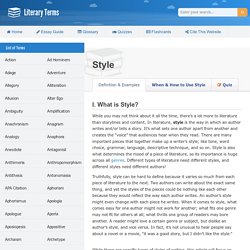
What is Style? While you may not think about it all the time, there’s a lot more to literature than storylines and content. Introduction to Literature. Old Fence.
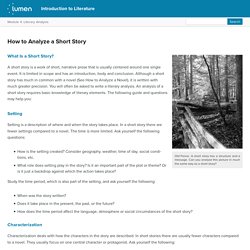
A short story has a structure and a message. Can you analyze this picture in much the same way as a short story? What Is a Short Story? A short story is a work of short, narrative prose that is usually centered around one single event. Author's Craft - Literary Devices. List of narrative techniques - Wikipedia. A narrative technique (also known more narrowly for literary fictional narratives as a literary technique, literary device, or fictional device) is any of several specific methods the creator of a narrative uses to convey what they want[1]—in other words, a strategy used in the making of a narrative to relay information to the audience and, particularly, to "develop" the narrative, usually in order to make it more complete, complicated, or interesting.
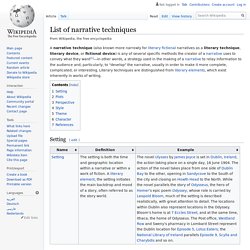
Literary techniques are distinguished from literary elements, which exist inherently in works of writing. Setting[edit] Plots[edit] Perspective[edit] Lexique des termes littéraires © Jeg. Plot (narrative) Plot and Story.
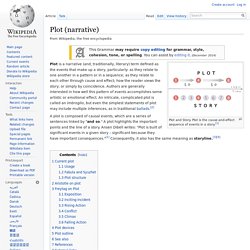
Plot is the cause‐and‐effect sequence of events in a story.[1] Plot is a narrative (and, traditionally, literary) term defined as the events that make up a story, particularly: as they relate to one another in a pattern or in a sequence; as they relate to each other through cause and effect; how the reader views the story; or simply by coincidence. Authors are generally interested in how well this pattern of events accomplishes some artistic or emotional effect. Fabula, la recherche en littérature. 150 Great Articles and Essays. Changing My Mind by Zadie Smith A great collection of essays about literature, writing and culture, along with more personal pieces Home By Subject By Author By Publication 150 Great Articles 100 Great Nonfiction Books By Subject By Author Greats Books.
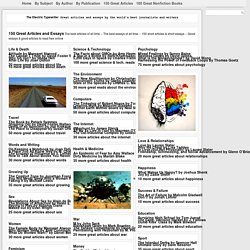
Italo Calvino's 14 Definitions of What Makes a Classic. 100 Best First Lines from Novels. 1.
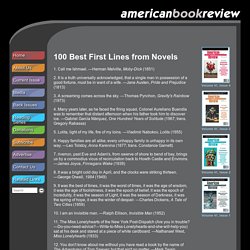
Call me Ishmael. Writers. The Written Word. Theory & Practice of Literary Criticism. Writing Materials. Il "doppiese", la lingua irreale delle traduzioni. #atozchallenge W is for The Writing Rule Book [Infographic] – Word Hunter. Writing Maxims to Live By, and Break “There are three rules for writing.
![#atozchallenge W is for The Writing Rule Book [Infographic] – Word Hunter](http://cdn.pearltrees.com/s/pic/th/atozchallenge-infographic-138560541)
What Famous Novels Look Like Stripped of Everything But Punctuation. Jacques Mattheij made a small, but awesome, mistake.
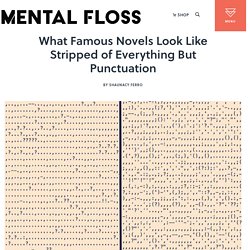
He went on eBay one evening and bid on a bunch of bulk LEGO brick auctions, then went to sleep. Upon waking, he discovered that he was the high bidder on many, and was now the proud owner of two tons of LEGO bricks. (This is about 4400 pounds.) He wrote, "[L]esson 1: if you win almost all bids you are bidding too high. " Mattheij had noticed that bulk, unsorted bricks sell for something like €10/kilogram, whereas sets are roughly €40/kg and rare parts go for up to €100/kg. The world's greatest literature reveals multifractals and cascades of consciousness. James Joyce, Julio Cortazar, Marcel Proust, Henryk Sienkiewicz and Umberto Eco.
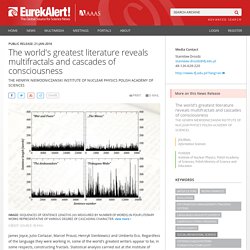
Regardless of the language they were working in, some of the world's greatest writers appear to be, in some respects, constructing fractals. Statistical analysis carried out at the Institute of Nuclear Physics of the Polish Academy of Sciences, however, revealed something even more intriguing. The composition of works from within a particular genre was characterized by the exceptional dynamics of a cascading (avalanche) narrative structure.
This type of narrative turns out to be multifractal. That is, fractals of fractals are created. As far as many bookworms are concerned, advanced equations and graphs are the last things which would hold their interest, but there's no escape from the math. Fractals are self-similar mathematical objects: when we begin to expand one fragment or another, what eventually emerges is a structure that resembles the original object. Prof. IFJ160121b_fot01s.jpg HR: in literature. The Psychology of Writing and the Cognitive Science of the Perfect Daily Routine. Reflecting on the ritualization of creativity, Bukowski famously scoffed that “air and light and time and space have nothing to do with.”
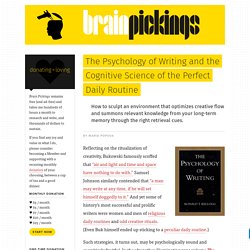
Samuel Johnson similarly contended that “a man may write at any time, if he will set himself doggedly to it.” And yet some of history’s most successful and prolific writers were women and men of religious daily routines and odd creative rituals. (Even Buk himself ended up sticking to a peculiar daily routine.) Such strategies, it turns out, may be psychologically sound and cognitively fruitful. In the altogether illuminating 1994 volume The Psychology of Writing (public library), cognitive psychologist Ronald T. [There is] evidence that environments, schedules, and rituals restructure the writing process and amplify performance… The principles of memory retrieval suggest that certain practices should amplify performance.
The Psychology of Cryptomnesia: How Unconscious Plagiarism Works. Le plaisir du texte - Roland Barthes. The art of the metaphor - Jane Hirshfield. To explore metaphors more fully on your own, there are three directions you can go. The first is simply to start noticing whenever you meet one. Jane Hirshfield slipped metaphors into many of the things she said in this lesson.
Metaphor and metonymy. In the unconscious: condensation and displacement[edit] In 1957, Jacques Lacan, inspired by an article by linguist Roman Jakobson, argued that the unconscious has the same structure of a language, and that condensation and displacement are equivalent to the poetic functions of metaphor and metonymy.[1][2][7] References[edit] ^ Jump up to: a b Roman Jakobson and Halle, Morris (1956) Two Aspects of Language and Two Types of Aphasic Disturbances in Fundamentals of Language. The Hague & Paris: Mouton, section The Metaphoric and Metonymic Poles^ Jump up to: a b Grigg, Russell (2009) Lacan, language, and philosophy, chapter 11 Lacan and Jakobson - Metaphor and Metonymy pp. 151–2, 160^ Jump up to: a b Dirven, René (2003). Le roman d’apprentissage ou conte initiatique. Le roman d’apprentissage, ou roman de formation, est un genre littéraire romanesque né en Allemagne au XVIIIème siècle (à ne pas confondre avec le roman de jeunesse).
Il s’oppose cependant à la fonction première du romanesque qui est de nous transporter dans un monde de rêve et d’évasion. Romanzo di formazione. Il romanzo di formazione o Bildungsroman (dal tedesco) è un genere letterario riguardante l'evoluzione del protagonista verso la maturazione e l'età adulta, nonché la sua origine storica. In passato lo scopo del romanzo di formazione era quello di promuovere l'integrazione sociale del protagonista, mentre oggi è quello di raccontarne emozioni, sentimenti, progetti, azioni viste nel loro nascere dall'interno. Etimologia e caratteristiche[modifica | modifica wikitesto] Nude in your hot tub, facing the abyss (A literary manifesto after the end of Literature and Manifestos)
Down from the Mountain Once upon a time, writers were like gods, and lived in the mountains. They were either destitute hermits or aristocratic lunatics, and they wrote only to communicate with the already dead or the unborn, or for no one at all. They had never heard of the marketplace, they were arcane and antisocial. Though they might have lamented their lives—which were marked by solitude and sadness—they lived and breathed in the sacred realm of Literature.
"DFW nella casa stretaga" secondo G. De Michele... This Is Water: David Foster Wallace on Life. On September 12, 2008, David Foster Wallace took his own life, becoming a kind of patron-saint of the “tortured genius” myth of creativity. Just three years prior to his suicide, he stepped onto the podium at Kenyon College and delivered one of the most timeless graduation speeches of all time — the only public talk he ever gave on his views of life. The speech, which includes a remark about suicide by firearms that came to be extensively discussed after DFW’s own eventual suicide, was published as a slim book titled This Is Water: Some Thoughts, Delivered on a Significant Occasion, about Living a Compassionate Life (public library). You can hear the original delivery in two parts below, along with the the most poignant passages. David Foster Wallace on Why You Should Use a Dictionary, How to Write a Great Opener, and the Measure of Good Writing.
By Maria Popova. David Foster Wallace on Writing, Self-Improvement, and How We Become Who We Are. By Maria Popova “Good writing isn’t a science. Vladimir Nabokov on Writing, Reading, and the Three Qualities a Great Storyteller Must Have. Language in Lolita. Kurt Vonnegut's 8 Tips on How to Write a Great Story. Le Cut-Up, William Burroughs. Critically and commercially successful postmodernist novels such as Slaughterhouse Five and The Book of Daniel present themsel. The combined silence. The cult section of the literary world. Stephen King's Top 20 Rules for Writers. Image by the USO, via Flickr Commons.
Steven Pinker: 'Many of the alleged rules of writing are actually superstitions' The Paris Review's Lorin Stein on the Power of Ambiguity in Fiction. Bird by Bird: Anne Lamott’s Timeless Advice on Writing and Why Perfectionism Kills Creativity. The Workhorse and the Butterfly: Ann Patchett on Writing and Why Self-Forgiveness Is the Most Important Ingredient of Great Art. Sara Toole Miller - Fiction & Non-Fiction Writer. Numéro Cinq » A warm place on a cruel web. Literary Hub: The Best of the Literary Internet.
The Rumpus.net. Review 31 Home. ReadySteadyBook - for literature... Open Letters Monthly - an Arts and Literature Review. Paris Review Daily - Blog, Writers, Poets, Artists - Paris Review. Writersroom - Homepage. Writer and Proud. We Make Zines - a place for zinesters - writers and readers. Digital Is. Explore the Genre Map.
Le romantisme - nature et sensation. Linguistics/Literature. Unmissable articles on writing. Writing sites. FMWriters.com. Backspace: The Writers Place. Welcome to Mystic Island: Home to the Best Serial Stories. Terrible Minds. Whichbook. Sad books make me happy. Longform. Word-Whores. All Freelance Writing - Freelance Writing Resource. Write hard. Write true. And write on. Script Frenzy. Ralan.com - Home Page. Make A Living Writing. Everest by Fog. The Allen Ginsberg Project. Harry Potter vs. Huckleberry Finn: Why the British Tell Better Children’s Stories Than Americans.
'patakosmos.